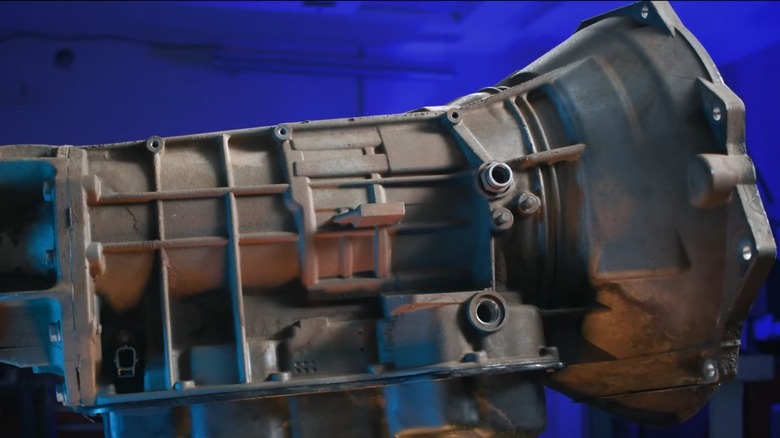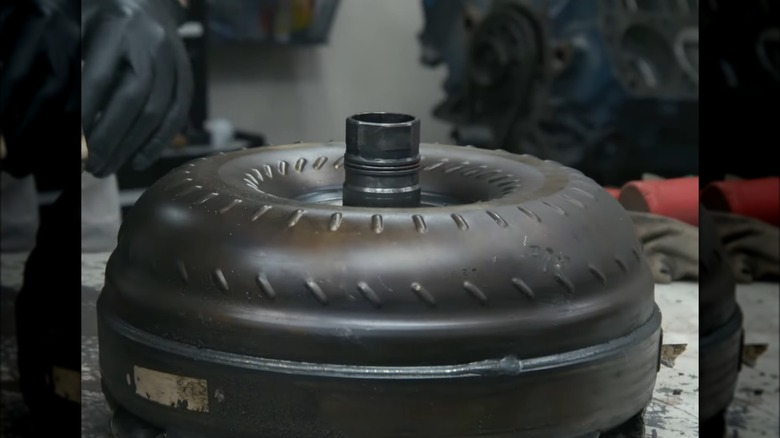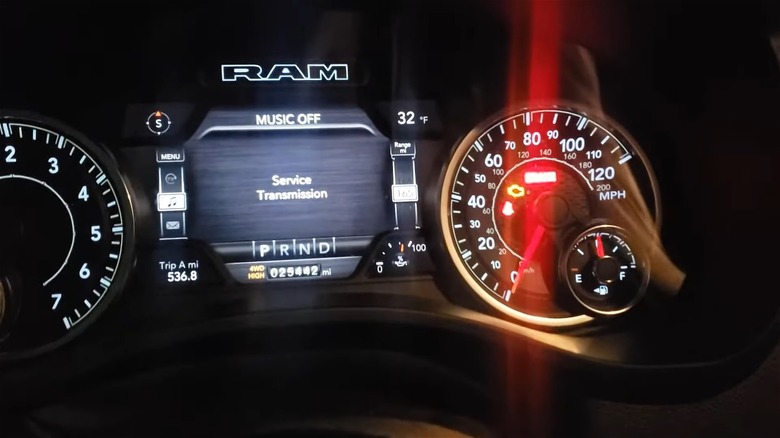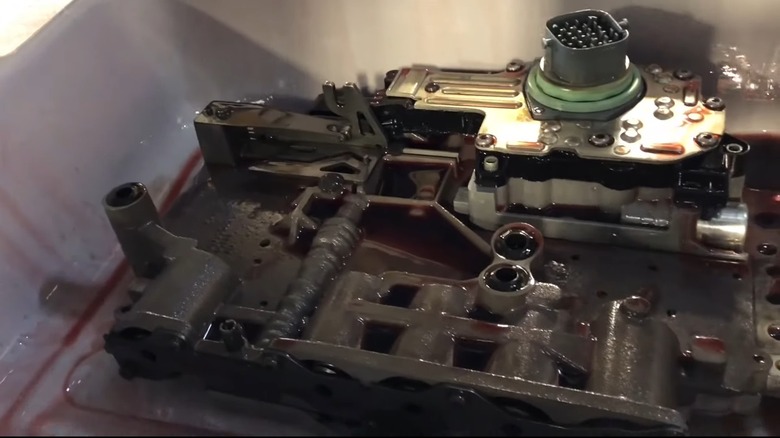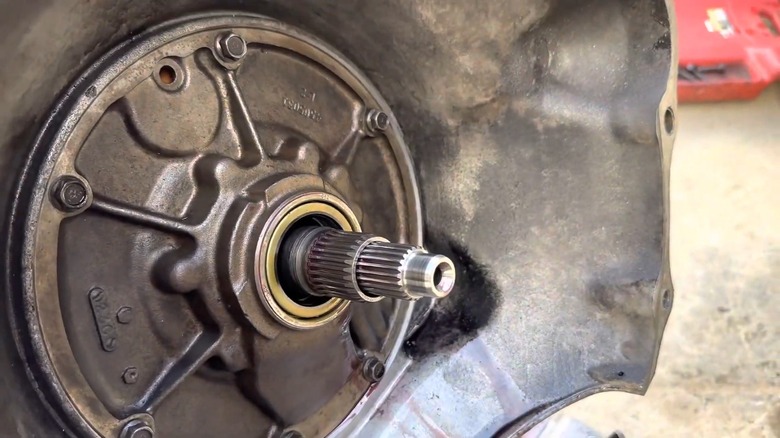5 Common Problems Found With Chrysler's 68RFE Transmission
The transmission in a vehicle must be able to function in challenging circumstances without fail. Arguably the hardest working part of the engine, the transmission doesn't get nearly the recognition or attention it deserves. The 68RFE, for example, isn't listed by name in the specifications of the latest heavy-duty RAM trucks, but it provides the necessary fortitude to complete grueling tasks. This six-speed automatic was launched by Chrysler back in 2007, and has been a staple ever since, especially in RAM trucks. In fact, one diesel technician explained to MotorTrend, "The 68RFE is a well-designed and strong transmission with gear splits suited to the normal load-moving tasks faced by heavy-duty RAM diesel pickups."
However, positive praise for Chrysler's robust transmission is only part of the story. The 68RFE has also experienced some issues that have occurred frequently enough to be considered common. Problems with this transmission include overheating, torque converter breakdown, electrical system glitches, solenoid issues, and a weak input shaft. Whether or not you have a 68RFE, you should also incorporate our tips to help maintain an automatic transmission for better longevity.
Things get too hot, resulting in several possible consequences
It's normal for an engine to heat up when running. In fact, if an engine isn't running between 195 and 220 degrees, it could indicate an issue. Of course, a transmission working with all its moving parts and under a greater load, like pulling a trailer, will get a bit hot. The issue with the 68RFE is that whether it be due to a sweltering day, pushing the transmission to its limit, or upkeep neglect, it's been known to go well past healthy operation temperatures.
The 68RFE is susceptible to a variety of ailments when reaching heat beyond its normal bounds. Problems such as odd burning smells, strange shifting behavior, and abnormal vibration during travel could all indicate the transmission is getting too hot under the collar. If you notice these symptoms quickly and get your transmission inspected, damage will likely be minimal. But, if you continually overheat your transmission, you could completely seize it up, necessitating either a rebuild or outright replacement.
Failing torque converter that causes shaking
The torque converter is an essential component that facilitates the movement of transmission fluid, transferring energy generated to the transmission. Unfortunately, the torque converter in the 68RFE can fail, causing shifting mishaps, shaking, or even non-operation all together. Abnormal vibration during acceleration can point to the torque converter as a potential cause, and this component of the transmission is vital for healthy performance.
Sometimes, the breakdown of the 68RFE torque converter is a result of one of its internal parts, the stator. The stator is one, but not the only, component that controls functions within the torque converter. It alters the amount of fluid exchanged and is responsible for the multiplying effect achieved by the torque converter. One of the specific issues reported with the 68RFE, is that the sprag, which is a type of clutch that either locks or allows the stator to rotate, breaks. Speaking of broken parts, there are things you need to stop doing if your car has an automatic transmission – otherwise, you may require a costly trip to the mechanic.
Sensors and software issues
Every engine has an array of sensors that are designed to quickly identify when things under the hood aren't going as planned. While these modules can be handy and alert you a trip to the auto repair shop might be in order, the sensors themselves can also malfunction. The Chrysler 68RFE unfortunately has experienced problems with faulty sensors, which can be located in challenging areas of the engine to reach. When a sensor goes out, it triggers warning lights or messages on the instrument cluster and can be a nuisance.
In addition to sensor issues, Nextgendiesel.com notes, "the 68RFE Transmission was not advanced enough in [its] logic to actually make good decisions about shift timing and driving dynamics. As a result, the transmission suffers from a perpetual case of confusion." Perhaps the cause of this indecision, or at least a contributing factor, is that the 68RFE has a few software bugs. Automotive engine components have become increasingly more complex and utilize computerized elements to dictate specific actions. For example, if you notice the typical smooth shifting of your RAM truck is suddenly jerking or changing gears at inopportune times, it could be a software issue.
Solenoid valve failure
There are so many small but essential actions taking place all over an engine at any given time, including the transmission. When you think about how many components must work together under the hood and time their actions correctly, it's a wonder there aren't more issues. The solenoid in an automatic transmission is essentially a mechanism with a valve that controls fluid. The transmission control unit (TCU) houses the solenoid and if the valve doesn't operate correctly, the lifeblood of the transmission (transmission fluid) fails to flow properly.
Those with a 68RFE transmission, have experienced sporadic shifting behavior, which removes much of the control a driver has over the vehicle. Sometimes, a solenoid failure can result in the transmission having difficulty shifting, only to suddenly engage, propelling you forward at speed. Modern transmissions like the 68RFE do have something called "limp mode," which can kick in during major malfunctions to help protect both the engine components and occupants of the vehicle. This measure of protection, once engaged, feels like all the engine output has been muted.
The 68RFE should've opted for a more robust input shaft
An input shaft is a part that grabs all the energy created by the torque converter and transfers it forward, enabling transmission operations. While not a complex component of the transmission, it's vital for operation and must endure significant pressure. Imagine a heavy-duty RAM truck towing a boat through steep grades to reach a mountain lake. That one input shaft can bring everything to a halt if it fails to usher the power through the transmission.
Considering this part is integral, it's strange that Chrysler didn't opt for a more robust version of the input shaft. Those who put their 68RFE transmissions through their paces with challenging workloads, might benefit from a stronger replacement. The stock part is prone to issues, as "[i]t's made of a soft steel alloy with poor tensility and tremendous yield," according to Next Gen Drivetrain. If you are unfortunate enough to encounter any of the above issues, you'll want to know more about the cost of automatic transmission repairs.
